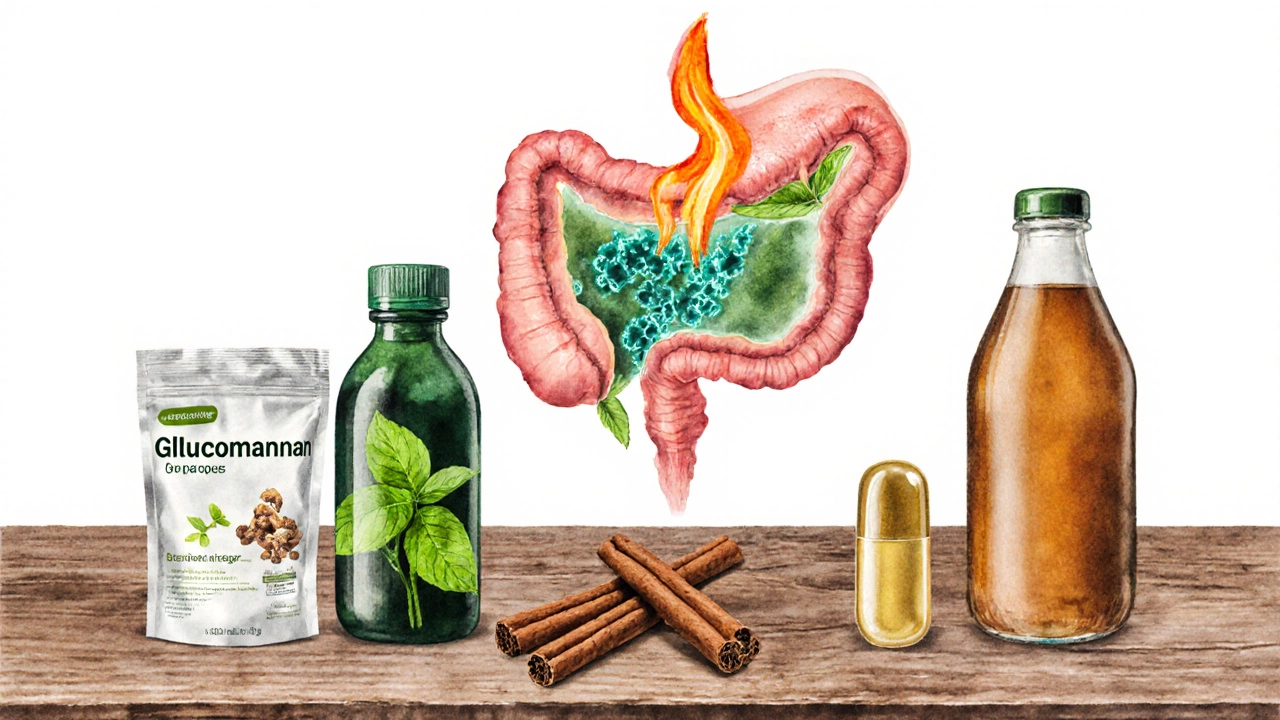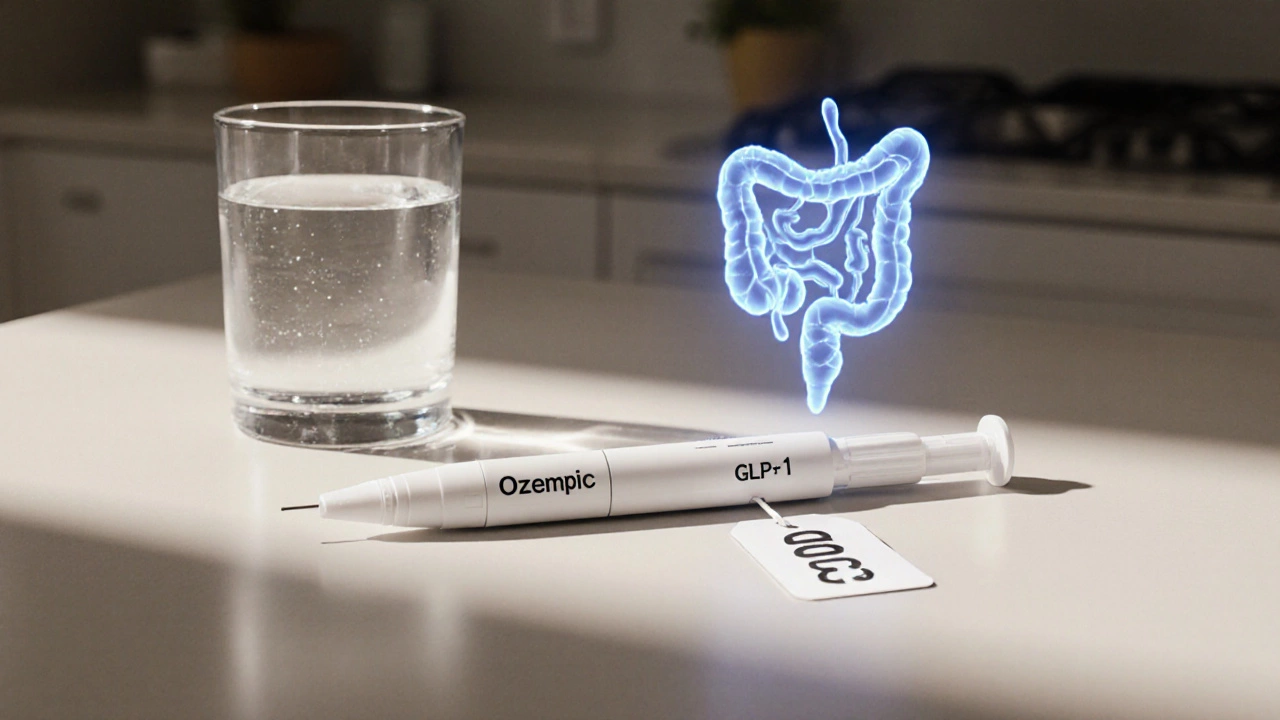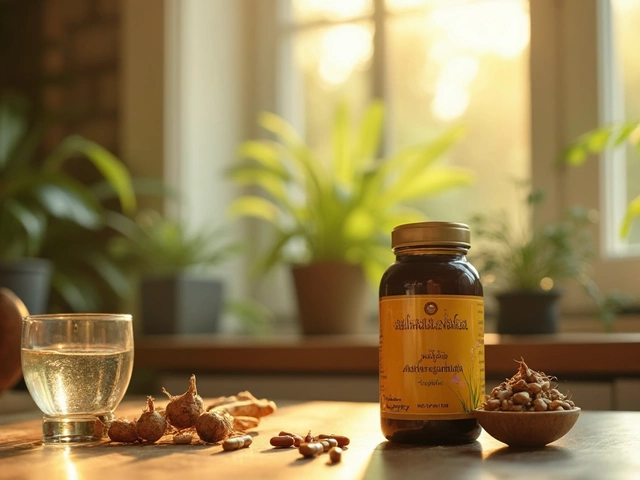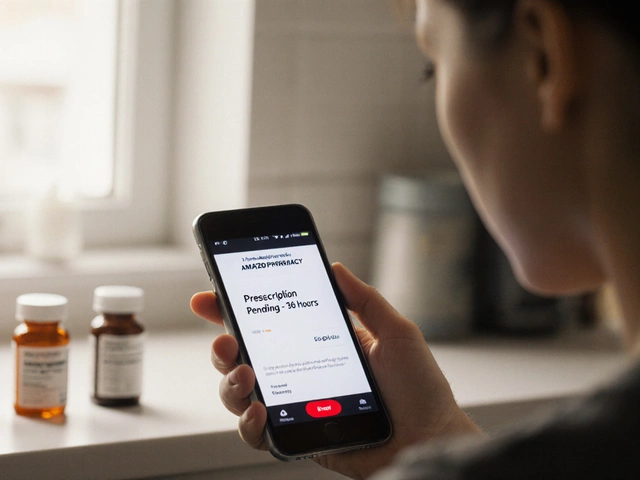OTC Weight Loss Alternative Comparison Tool
Find Your Best OTC Weight Loss Option
Compare popular over-the-counter alternatives based on your priorities
When you hear about Ozempic, the first thing that comes to mind is a powerful prescription drug that helps many people shed pounds. But the drug costs a lot, requires a prescription, and isn’t available without a doctor’s visit. So, what can you buy off the shelf that offers a similar boost to weight loss? Below we break down the science, list the most credible over‑the‑counter (OTC) options, compare their strengths and weaknesses, and give you a clear path forward.
What Ozembic Actually Is
Ozempic is a brand name for semaglutide, a GLP‑1 receptor agonist that mimics the gut hormone GLP‑1 to lower blood sugar and reduce appetite. It is approved for type 2 diabetes and, more recently, for chronic weight management at higher doses. The drug works by slowing gastric emptying, increasing feelings of fullness, and modestly boosting insulin secretion.
Why People Look for OTC Substitutes
The appeal of an OTC option is simple: lower cost, no doctor’s appointment, and the ability to start right away. However, the trade‑off is that most non‑prescription products lack the robust clinical data that backs Ozempic’s results. Understanding the mechanism behind Ozempic helps you evaluate whether an OTC product could plausibly deliver similar outcomes.
Key Mechanisms to Replicate
- Appetite suppression - slowing the brain’s hunger signals.
- Reduced calorie absorption - limiting how much food the gut processes.
- Improved insulin sensitivity - helping the body use glucose more efficiently.
OTC products that target any of these pathways are the closest matches.

Top OTC Candidates and How They Stack Up
Below is a quick rundown of the most researched, widely available supplements that aim at one or more of the mechanisms above.
| Ingredient | Primary Action | Typical Dose | Evidence Strength | Pros | Cons |
|---|---|---|---|---|---|
| Phentermine | Appetite suppressant (sympathomimetic) | 15‑37.5 mg daily | Strong clinical data (prescription) | Rapid weight loss, widely studied | Potential cardiovascular side effects, habit‑forming |
| Glucomannan | Viscous fiber - expands in stomach | 1‑4 g before meals | Moderate - several RCTs show 1‑2 kg loss | Natural, inexpensive, improves gut health | May cause bloating, must drink plenty of water |
| Green Tea Extract | Boosts thermogenesis via catechins | 250‑500 mg EGCG daily | Moderate - meta‑analysis shows modest loss | Antioxidant benefits, easy to find | High doses may affect liver enzymes |
| Berberine | Improves insulin sensitivity, modest appetite control | 500 mg 2‑3 times daily | Emerging - small trials show 2‑3 kg loss | May lower blood sugar, helpful for pre‑diabetes | Can cause GI upset, interacts with some meds |
| Cinnamon Extract | Enhances insulin signaling | 250‑500 mg daily | Weak - mixed results | Flavorful, can be added to food | Limited weight impact, possible blood‑sugar drop |
| Apple Cider Vinegar | Delays gastric emptying, modest appetite reduction | 1‑2 tbsp diluted in water before meals | Weak - small studies show <1 kg loss | Easy to buy, may improve digestion | Tooth enamel erosion, heartburn risk |
How to Choose the Right OTC Option for You
Not every supplement fits every lifestyle. Use this quick decision tree:
- If you need fast results and are okay with a prescription‑style stimulant, Phentermine (available in some OTC “diet pills” in low doses) is the closest functional match, though you’ll still need a pharmacist’s guidance.
- If you prefer a natural, low‑risk approach, start with Glucomannan or Green Tea Extract. Pair them with a high‑protein diet to amplify satiety.
- If you have pre‑diabetes or mild insulin resistance, add Berberine or Cinnamon Extract to support blood‑sugar control.
- If you enjoy vinegar‑based dressings and want a gentle appetite cue, try Apple Cider Vinegar diluted in water.
Remember, the best results come from combining a supplement with solid nutrition, regular movement, and adequate sleep.

Safety First: Common Pitfalls to Avoid
Even OTC products can cause problems if misused. Keep these warnings in mind:
- Never exceed the recommended dose of fiber supplements like Glucomannan - too much can block the throat.
- Check for interactions with blood‑thinners, especially when using high‑dose Green Tea Extract or Berberine.
- Watch for stomach upset; start with half the dose and build up.
- Pregnant or nursing mothers should avoid stimulants like Phentermine and discuss any supplement with a healthcare provider.
Real‑World Example: A 4‑Week Trial Plan
Meet Raj, a 38‑year‑old software engineer from Bangalore who wanted to drop 6 kg without a prescription. He followed this simple protocol:
- Morning: 2 g Glucomannan mixed with 250 ml water, 30 minutes before breakfast.
- Mid‑day: 500 mg Berberine after lunch.
- Evening: 1 tbsp Apple Cider Vinegar diluted in water before dinner.
- Exercise: 30‑minute brisk walk after dinner.
After four weeks, Raj lost 4.5 kg, reported reduced cravings, and his fasting glucose dropped from 102 mg/dL to 94 mg/dL. He credited the combo of fiber (for fullness) and Berberine (for better glucose handling) for the success.
Bottom Line: No Magic Pill, But Viable OTC Paths
Ozempic’s power comes from a medically engineered hormone that you can’t legally replicate without a prescription. However, a blend of proven OTC ingredients-especially fiber, thermogenic extracts, and insulin‑sensitizing botanicals-can mimic parts of its effect. The key is to pick a strategy that matches your health profile, budget, and willingness to stick with a routine.
Can I buy Ozempic without a prescription?
No. Ozempic is a prescription‑only drug in every major market, including India and the U.S. Buying it without a doctor’s note is illegal and unsafe.
Is Phentermine really an OTC product?
Low‑dose Phentermine is sometimes marketed as a “diet pill” in health stores, but many countries still require a prescription. Check local regulations before purchasing.
How much Glucomannan should I take?
Start with 1 g before a main meal, mixed with at least 250 ml of water. You can increase to 3 g per meal, but always keep hydrated to avoid choking hazards.
Are there any side effects of Green Tea Extract?
High doses may cause liver enzyme elevation or jitteriness due to caffeine. Stick to 250‑500 mg EGCG daily and avoid taking it on an empty stomach.
Which OTC supplement works best for appetite control?
Glucomannan has the strongest evidence for acute appetite suppression because it expands in the stomach and signals fullness.
Can I combine multiple OTC supplements safely?
Yes, many people stack fiber (Glucomannan) with a thermogenic (Green Tea) and a glucose‑modulator (Berberine). Start with low doses, monitor how you feel, and talk to a pharmacist if you take other medications.

 Is Ashwagandha Safe? What You Really Need to Know Before Taking It
Is Ashwagandha Safe? What You Really Need to Know Before Taking It
 Why Therapists Watch Your Hands: Understanding Non‑Verbal Cues
Why Therapists Watch Your Hands: Understanding Non‑Verbal Cues
 How Long Does Amazon Pharmacy Take to Approve a Prescription?
How Long Does Amazon Pharmacy Take to Approve a Prescription?
 Understanding the Most Aggressive Cancer Types
Understanding the Most Aggressive Cancer Types
 Can You Live Independently After Open-Heart Surgery? Essential Tips and Insights
Can You Live Independently After Open-Heart Surgery? Essential Tips and Insights